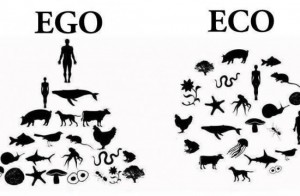December 12, 2013 – Some food for thought before the arrival of Christmas 2013 and the developing of resolutions for the coming year 2014.
What is in our near future? What I hope and what I think are two different things. As a result I ask and suggest some answers to these three questions:
- Should nations look at “happiness” of citizens rather than gross national product as a measure of success?
- Should companies move to an ECO mindset rather than be consumed by their EGO?
- Should we humans recognize that we are all collectively on this planet along with the rest of life here and pay attention and address climate change once and for all?
Gross National Happiness – a New Measure of Success
In the nation of Bhutan the government is dedicated to developing a measure they call GNH. They have been since 1972 when the king declared this measure to be more important than GNP. I think, from the title of this section of the posting, you know what GNH means.
So how do you measure happiness? According to Bhutan you look at those not-yet-happy and improve conditions to move them toward happiness. You can do this by policy initiatives and government programs that focus on decreasing poverty, hunger, disease and income inequality. You can do this by working with the private sector to improve the country’s environment, by creating new jobs, by meeting the needs of young people, by delivering quality education, by building infrastructure and energy capacity, by making rural and urban environments more livable, and by finding “harmony with nature.” The last point truly reflects the Buddhist ideals, the predominant religion of the country.
In measuring GNH Bhutan established 124 variables. The government acknowledges that not all variables need fulfillment for all the people. After all some will choose to live with a lesser degree of happiness. So the country has created categories to address the current weighting of happiness and a way to measure its progress in achieving higher GNH for its people.
Citizens have been classified as unhappy, narrowly happy, extensively happy and deeply happy. In a 2010 countrywide survey, the nation was polled to address the 124 variables of GNH and these results were plotted to the aforementioned categories. The government found the following:
- 10.4% of Bhutanese were unhappy,
- 47.8% were narrowly happy,
- 32.6% were extensively happy,
- 8.3% were deeply happy.
The median score for the country was 41% happy and 59% insufficiently happy or unhappy. From this GNH measure Bhutan has developed a series of guidelines and policies that cover:
- Psychological well being,
- Living standards,
- Ecological diversity and resilience,
- Community vitality,
- Good governance,
- Cultural diversity,
- Education
- Health
- Work
- Play
- Spirituality
Measuring GNH sounds a lot better and smarter in the long-term for all of us on this planet, not just the citizens of Bhutan.
Corporate ECO versus EGO
We have grown up in a world where we use the measure of growth to equate with success. It’s only natural. We are born. We grow. When we complete our education we expect to get a good job and watch our income rise as we age. Companies are no different than humans and hence they tend to act like individuals. Remember Mitt Romney’s statement that corporations are people too?
The problem is that growth in an infinite space can continue forever. But in a confined area you can only grow so much before you run smack dab into someone else growth. You see this with plants in a pot. They compete for soil, water and sunlight and those that are most aggressive become dominant.
This is the way Western society has built itself. This is what capitalism is all about, EGO-centered, taking as much of the sunlight as it can from all those around. And it is EGO that is the negative disruptive force pushing humanity along a path towards a dire future. Shifting from EGO to ECO is apparently not easy for corporate players and particularly for publicly-traded businesses who are beholding to shareholders who are also in the business of EGO.
So how do we go about making the shift? First of all what do we mean by ECO? It means developing an eco-economy, one in which we seek sustainable goals. Let’s take an example.
ExxonMobil, one of the largest energy companies in the world has been earning tens of billions of dollars per quarter for the last several years. The shareholders have been ecstatic. But some shareholders recently formally asked the company how it is addressing “unburnable assets.” They asked this for EGO reasons but the implications are ECO. ExxonMobil’s shares are valued based on both assets in the market as well as those in the ground. The shareholders recognized that climate change, an ECO issue, needed to be addressed in the near future and wanted the company to explain its vision for the future. Interestingly enough just a few days ago ExxonMobil indicated they were incorporating carbon taxes in their long-term financial forecasting, anticipating that governments would be implementing such strategies to combat climate change. One could argue that the above suggests a subtle move from EGO to ECO is beginning at ExxonMobil.
The move to ECO from EGO for corporations emphasizes the “CO.”
- CO-operating with governments attempting to implement sustainable policies and programs,
- CO-sharing ideas and plans transparently with the public,
- CO-mmunicating openly about progress in achieving sustainable objectives,
- CO-creating with other industry players to invent new solutions,
- CO-nnecting through social media to engage a larger public.
Climate Change and Humanity
Toronto for the last week has been in a cold snap. Temperatures have plummeted well below zero. So is global warming dead and should all of us tell the scientists that they don’t know what the heck they are talking about?
Weather is weather but climatology is more than just a local forecast or a few days of cold weather. As much as there is a small degree of uncertainty about anthropogenic climate change, that nagging 5% from the recent IPCC interim report, it is the bigger number, the 95% that we need to pay attention to. That’s the certainty side of the climate change consensus.
Another number of importance to pay attention to is “400.” That is the number of parts per million of CO2 in our atmosphere today. That’s up from 350 a mere half-century ago. And most of that increase has occurred in the last two decades, corresponding with a significant expansion in our burning of fossil fuels to meet energy demands in both the Developed and Developing World.
It is hard to ignore the elephant in the room, that CO2 number. For all of us on planet Earth, EGO must transition to ECO if we are going to tackle the challenge effectively and minimize the damage our descendants will experience. Because we may experience weather related to climate change at some point in our existence, but our children’s children will see much more significant climate impacts, and their children’s children will experience even more.
Christmas and the coming New Year are a good time to reflect on these issues. We want a world in which we can measure happiness and watch it grow. We want a world where we work together to achieve common goals for all life on this planet. And we want a world where we create a legacy of clean air, clean oceans, abundant biodiversity, and a sustainable future.














